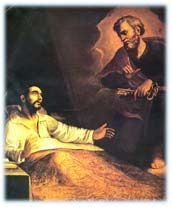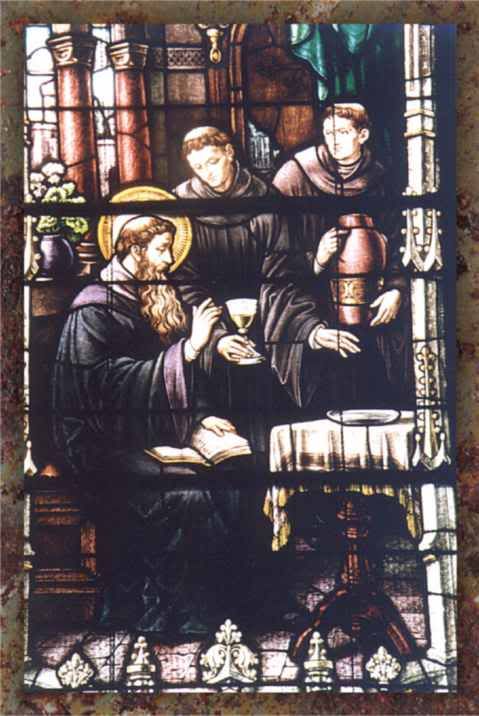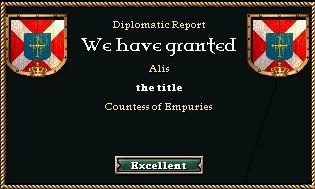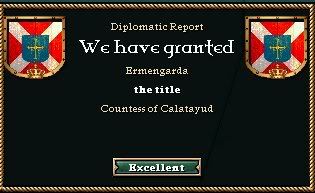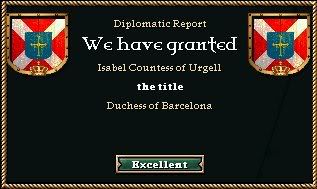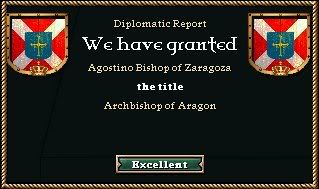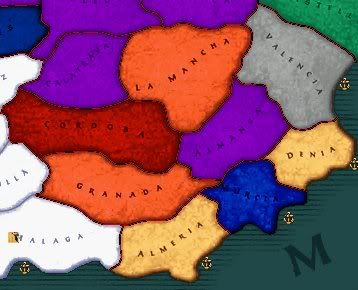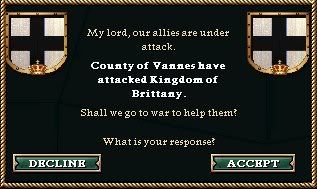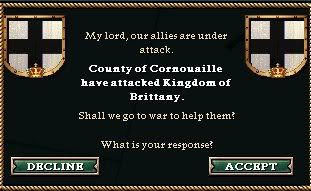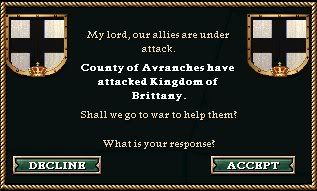The Aquitanian army headed by Mateu de Bourbon was ready to march on the revolt as soon as the weather cleared in the early spring of 1128. Comprising four thousand men, the force was superior in numbers to the assembled Breton rebels but would have to deal with a long supply line from the northern provinces of Aquitania as well as a hostile countryside. Allied support from the loyalist camp would likely be negligible, sapped as their armies were from their losing campaigns of the previous year. With the blessings of his King conveyed in the last war council before his departure, Mateu set out to met his regiment.
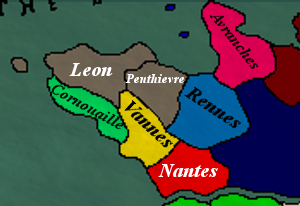
Marching into Nantes, Mateu was unsurprised by the desolation the conflict had visited upon the countryside by raiding rebel troops. With King Llewelyn’s few faithful soldiers manning the ramparts of his castles, the common folk had nothing to protect them from the depravations of the foe and the few scattered villages that were not burnt out were fortified with layers of palisades. Bones from livestock, wreckage from carts shared the roadside with filthy refugees making their homes from scraps of tent fabric and the meager possessions they had saved from their hovels. Several small groups of armed men were observed by the scouts during the march, deserters preying off the refuse and chaos left with the breakdown of authority. The recovery of the Kingdom would undoubtedly take years and the scars created by the conflict fester for generations.
Messengers from the Breton King greeted the Aquitanian army as they crossed the blasted landscape, praising Mateu’s appearance as the salvation of Brittany and eagerly offering the hospitality of Nantes castle to the Count and his entourage. Mateu declined the invitation, knowing that his mission to liberate the country could brook no delay and that he must therefore focus on locating and defeating the rebel forces in the field. Letters detailing strategic intelligence passed between the Breton marshal and the Count, allowing Mateu to plan his advance to the rebellion’s homeland in Penthievre and Leon. As was feared, loyalist Breton forces were far too weak to be of any help in the campaign even if the King could have been convinced to letting them leave the citadel.
The shape of the rebel plans was soon clear to Count Mateu as he studied the patchy reports provided by the Breton staff sent to accompany his army. Significant enemy forces were thought to be concentrated in both Vannes and Penthievre, preparing for a final push against the King’s fortress in Nantes to secure their victory. Unwilling to divide his own army to attack each separately given the difficulties in logistics and communication, Mateu choose to move against the enemy gathering in Penthievre and hoped that his pressure on the homeland of the rebellion would give the traitorous vassals pause in their attack against the loyalist capital. Parting from the fields of Nantes, the Aquitanian expeditionary army soon found itself in battle.
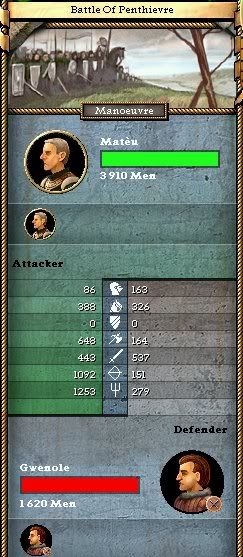
Meogon Penteur stood at the head of his own army, drawn from the disillusioned Breton noblemen who saw the imposition of King Llywelyn on their country as intolerable. The Duke’s promise to return Brittany to Breton rule and the recent glories of Marc Kerne had struck a resounding cord with both his direct vassals and others fed up with the incompetent foreigner King. The last year had seen great successes with numerous other counts on the peninsula had throwing off the yoke of the crown’s rule and the royal demesne in Spain neutralized by Muslim insurgents. While he was far from pleased at the loss of those territories to the infidel, it only made his victory against the inept Llywelyn easier.
Unable or unwilling to meet his foe’s army in a pitched battle, the Breton King retreated to his castles and effectively ceded the countryside to Meogon, who was all too keen to attack the exposed territory and thumb his nose at royal authority. Aquitanian attention and assistance, on which the survival of the hated crown depended, had first been drawn south by Sevilla then kept in check by their King’s illness. Now the Breton Duke faced an Aquitanian army whose size was over twice his own in his own province. With the rest of his army away preparing for the final offensive on the royal enclave at Nantes in neighboring Vannes, only drastic action would allow his campaign for liberation and the overthrow of the monarchy to continue.

Escape with as many troops as possible was the only course Meogon and his fellow commanders saw as reasonable; whatever survivors managed to meet up with the other detachments would only increase the chances of success against the King before Aquitanian manpower wore the revolt down. Their own homes, left open to attack with the withdraw, might have to be sacrificed for the overarching goal of settling the crown. Seeking to disengage themselves from the main body of Aquitanians, the rebel troops made for series of bridges crossing a sizeable river to the southwest. Consultation of his maps and recent intelligence reports quickly informed Count Mateu of the rebel plan and he ordered an immediate move to interdict the escaping troops.
A series of heavy skirmishes between the rearguard of the rebel army and the pursuing Aquitanians defined the day. Each confrontation told markedly in Mateu’s favor, his light cavalry cutting through any formation of rebels that dropped behind the protection of their fellows strung out for the march. Casualties mounted on the rebel side until the crossing was in sight, a mad rush by the leading elements to the opposite side to escape the trailing Aquitanians characterizing the last frantic minutes. With night settling in and both sides exhausted from the chase, both Aquitanians and remaining Bretons of the rearguard settled into a weary rest.
Knowing that another day of pursuit would likely see the destruction of his entire army, Duke Penteur immediately set orders for the rapid destruction of the bridge with the rearguard still on the opposite side of the river. The ancient stone greatly resisted the tireless work of the laborers but before morning a sizeable gap had been opened on the causeway. Withdrawing once more after leaving a small force to harass any attempt to bridge the gap, the rebel troops marched to join their comrades in Vannes.
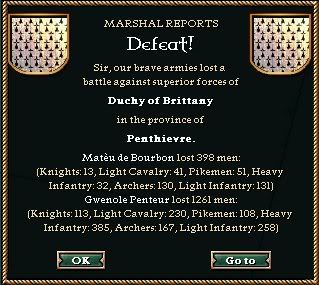
While the number of casualties stood highly in his favor, Count Mateu could only consider the escape of hundreds of rebel troops a sort of defeat in itself. The remaining rebel troops on his side of the river had surrendered after light fighting and the garrison left to annoy the Aquitanian troops set on repairing the gap in the bridge was only slowly being nullified. Unencumbered troops might easily make it to the other side of the river without the aid of the bridge, but the carts and draft animals carrying the supplies on which it depended were not so likely to survive a crossing. Other passages further along the river might be used as well, but they would likely take more time out of the way than the repairs. Four interminable days passed before the bridge was declared fit for army’s crossing and a series of hard marches designed to again bring the foe to battle soon left the expeditionary regiments faint with fatigue. It was not until the outskirts of Nantes province itself that the Aquitanians again confronted the rebel troops moving to attack the last obstacle between their overthrow of King Llywelyn.
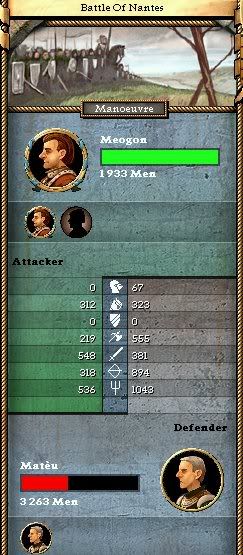
The balance of powers much more equal in this engagement than the last, Meogon felt confident enough to take the offensive against the Aquitanian positions. The two bodies of infantry crashed together like two waves of flesh and steel, the Aquitanian line buckling under the fervor of the Breton attack. Count Mateu could see that his soldiers would not hold under the continuous pressure applied by the rebel attack, they had been pushed too hard in the pursuit and were now paying the price on the field of battle. Both sides committed every reserve to the melee, neither willing to let any resource go to waste in this battle to the death. Thoughts of how he might deal with the political and social fallout of such an odious defeat whirled through the Count’s mind quicker than he could take account of them.
It was a complete surprise to all involved in the battle when a small mounted force appeared atop one of the low ridges surrounding the plain on which the fight was being held. After heated discussions with his generals over the necessity of assisting the Aquitanians, King Llywelyn had stridently refused to authorize any such adventure that might take men from the garrison. Led by the only duke to stay loyal to the crown, Geoffroy Beskond, over a hundred Breton horsemen had chosen to disregard the King’s order and it was they that drove down into the exposed flank of the rebel host before they could maneuver and wheeled again and again to strike at the perplexed and distraught rebels. The massive stroke of providence lifting their spirits, the Aquitanians soon matched then exceeded their foes in the intensity of their fighting.
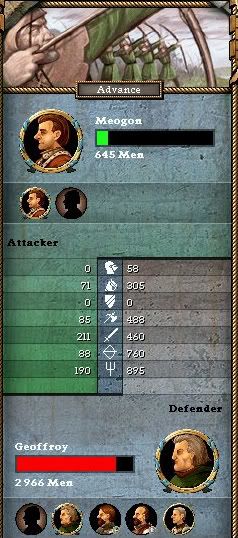
The sudden shock of the loyalist cavalry and renewed vigor of the Aquitanians sealed the downfall of the rebellion on the battleground of Nantes; Meogon Penteur fleeing the field with the scattered remnants of his army for the interior of the peninsula. Geoffroy himself fell in the battle, struck down by an unlucky javelin hurled by a rebel irregular and hundreds of Aquitanians had breathed their last fighting for a foreign cause on foreign soil. The two allied forces greeted one another warmly and Mateu thanked the surviving leaders of the regiment graciously for the pivotal role they had played. Still, the march back to the gates of Nantes castle was a mutedly sober affair as the summer sun and accompanying heat made its first appearance of the year.
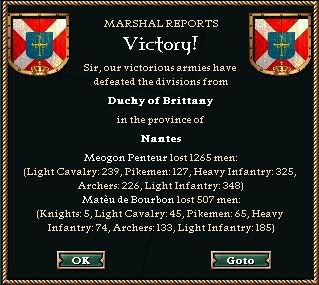
Several weeks after he had first arrived in Brittany, Count Mateu de Bourbon finally made his way to an audience with King Llywelyn. The signs of the countries scarcity were evident even in the King himself, a young man that cut a gaunt figure sitting on his throne with a smile that pulled the stretched skin of his face even tighter. Those courtiers in audience to the King looked malnourished and weary, the year of self produced siege seeming to lie heavily on their spirits. Through a translator, Mateu was praised for the deliverance of the country and crown and asked what the plans were for the continuation of the campaign.
The Count responded humbly, saying that the arrival of the loyalist cavalry had turned the tide and commenting that the foe was all but beaten with the two battles destroying their manpower reserves. The lengthy process of siege would still need to be carried out but no other difficulty could be foreseen. Operations against the rebel citadels would likely last until the end of the year and Mateu emphasized that a secure supply line from the Breton provinces would be the only way to accomplish the goal.
It was with great shock that Mateu listened to the King respond that the nobles that had lead the cavalry force had been imprisoned and stripped of their lands for the dereliction of their duty to guard the castle and stood in danger of being executed. Seemingly surprised at the outburst of protest that came from the Count regarding his royal judgment of the men, King Llywelyn quickly grew incensed himself and angrily ordered the general removed from the audience chamber. Numb from the initial outburst of anger, several courtiers stepped forward to urge restraint but ended up only fanning the flames of the Breton King’s temper. Turning his back and departing quickly as the monarch launched into a rambling tirade against the traitors within his own walls and in the armies of his allies, Mateu cursed under his breath at the injustice of Llywelyn.
Tense weeks resulted from the confrontation in the audience room, with Mateu refusing to meet again with the Breton King unless he promised the release of those men who had ridden to the assistance of the Aquitanians. The rest of the Aquitanian leadership in the army supported the move personally, but were fearful of the consequences that standing up to the King would produce.
For his part, Llywelyn snubbed the suggestion that a count dictate the terms of how he might rule his own Kingdom and demanded that the expeditionary force be removed from his territory despite the earnest entreaties of his advisors. The rebel threat to the capital was averted for the moment, but the depleted loyalist Breton armies could not hope to regain the lands still in rebel hands without Aquitanian assistance. Outside the walls of Nantes citadel, the Aquitanian army waited while a war of words raged in the leadership.
In Bordeaux, King Guitard had spent the last months idly working through state issues as they presented themselves while still keeping as up to date as possible with the campaign in Brittany. Little Raimond, heir to the throne, had been sent with a significant staff to live with members of Chancellor Rosa’s extended family on their estate outside the capital. His mother had convinced Guitard of the necessity of the move despite the strident protests of Eve to have the boy stay within the castle. The parting of mother and child had been bitter and the Queen had refused to see the King for several days after the event.
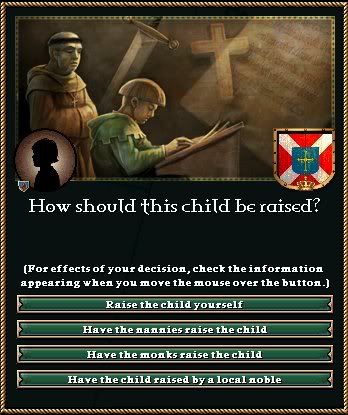

Receiving messages from the Breton campaign, King Guitard was happy to see the relative success the expeditionary army was having and celebrated with the rest of the cabinet at the news of the crucial victory in Nantes. Yet, as reports of the growing confrontation between Mateu and Llywelyn started to dominate discussion within the council, a critical choice needed to be made once again. The Breton King had dictated several letters addressed to the Aquitanian monarch, each more demanding and threatening than the last, culminating in a promise not to feed the expeditionary army unless Mateu was recalled and stripped of his title. Indignant at the tone these letters took, Guitard sent his own strongly worded replies that continued for weeks without making any headway on the issue. Several councilors suggested removing the impertinent count with a more pliable subject while others pressed the moral issue and the impertinence of Llywelyn’s demands insisted that Guitard threaten to remove the army if the Breton nobles weren’t released.
As the days drove on and the situation grew more and more divisive, a chance at peace found its way to the capital. A ship carrying a senior Breton nobleman aligned with Meogon arrived with his staff to seek terms with which to leave Aquitania out of the war. Charismatic and convincing in his speeches before the council, the nobleman urged that the conflict between their respective lands was but a drastic mistake that had gone on for far too long. Peace, cooperation and understanding had defined Breton-Aquitanian relations up until this point, why not return to it? Llywelyn himself was not suited for the throne and repaid the support and sacrifice of Aquitania with caustic remarks and treachery.
Many of the nobleman’s points struck home to the Aquitanians. The upkeep of the army in normal circumstances was a significant drain and Llywelyn’s threat to cut his own supply would only cause greater hardship. Truly, the Breton-Aquitanian relationship had been driven downhill by the personality of the Welsh immigrant King and no reciprocation for the time, effort and money spent on the war seemed likely to be forthcoming given the shattered state of the Breton empire. The continuation of the war would only lead to the lost of more life and gold coins with no gain. Still, the thought of acting against the man who stood as his “ally” left a bitter taste within King Guitard’s mouth.
It was with a heavy heart that Guitard, acting with the majority of his councilors in support, accepted the terms presented by the Breton negotiator. A sizeable indemnity would be taken and exclusive trade rights and tax exemptions giving to Aquitanian merchants in lands under Meogon’s control for five years. In return, the Aquitanian army would be withdrawn from Nantes and would not interdict in Breton affairs as the war continued. It seemed only likely that the recovery of his losses and assurances of Aquitanian neutrality would allow Meogon to finally achieve his goal.
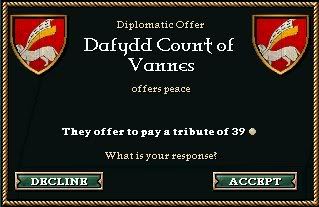
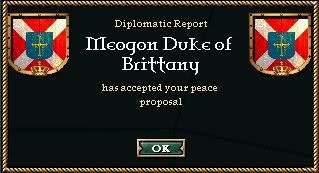
The order for Mateu to turn his army for the Aquitanian border was a welcome relief to the incessant bickering that had characterized exchanges between himself and Llywelyn for the last months; the worn out messengers that carried the missives between the castle and the encamped army outside would finally be given a break. Without informing his host, the Count called for the force to be made ready to move out. Raising the army from its lethargy in the summer heat took longer than expected and the army was only able to make half of its normal marching distance by nightfall. Riders sent from the castle demanded to know the meaning of the move, consistently arguing that rebel troops would undoubtedly strike at the unprotected capital. Mateu did not bother to make a response.
The attack on Nantes did come, but from a wholly unexpected source. North African pirates, operating from bases leased from the Emirate of Sevilla on the north coast of Spain, had been raiding along the coast of Brittany since the outbreak of hostilities. With no organized response from the embattled crown the attacks had been highly successful, escalating from small fishing villages to inland market towns. This series of achievements drew yet more of the pirates and whetted their taste for more slaves and plunder.
The ultimate assault came on the citadel of Nantes itself in the fall of 1128, with a large war party of Muslim pirates and brigands marching inland to besiege the isolated castle. Their hope was to capture and ransom the King himself, a notorious shut in, and their plan seemed possible with the absence of the Aquitanian army and general weakness of the garrison. It was not until the lightning assault carried the walls from the unprepared defenders that they discovered that the King had retired to Rennes and the greater safety of the citadel and allied troops there mere days before the attack. Contenting themselves with an orgy of plunder in the castle and surrounding villages, the majority of the pirates retreated, yet others remained to use the castle as a base to strike at other targets in the region.
The territorial situation on the Breton peninsula could not have been more chaotic as 1128 drew to a close. Muslim bandits occupied the former capital of the Kingdom while the King himself was reduced to a beggarly existence at the last remaining loyal court in Rennes. Duke Meogon had extended his dominion over Vannes and easily stood as the most powerful force emerging from the patchwork of fiefs torn from the body of the ailing Kingdom. Still, the situation was out of control.
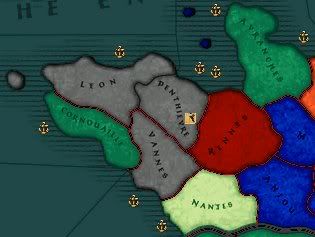
In Bordeaux, King Guitard and the rest of the notables of the court considered how to deal with the ongoing chaos. Relations with the nominal King of Brittany had been cut off almost entirely when the seperate peace negotiated between the Duchy of Brittany and Aquitania became known and it seemed likely that matters would have to be handled without Llywelyn's input. The terms of the treaty had stipulated that the Aquitanian army would not interfere with the peninsula but it had not envisioned the creation of a Muslim state just across the border from that Kingdom. So far, no major raids from the pirates ensconced at Nantes had been aimed at the well prepared Aquitanian border guards but it seemed only a matter of time before the event occurred. Another meeting with the Duchy of Brittany regarding these developments was essential to the security of the country.
Additionally, in the northern fief of Poitiers, an occasion of no small importance came to be. Driven from the court of Brittany with the death of his father nearly three years previously, Marc Kerne had managed to evade those he was convinced sought to end his life; as the last surviving issue of the King, he had been seen as the logical focal point of any rebellion. The Bastard of Nantes had skillfully made his way through the courts of several counts and dukes in France and England before finding the protection of Poitiers, where he asked to be transported to Bordeaux and given an audience with King Guitard.
The Aquitanian King sent word to make preparations for Marc's journey to the capital.






